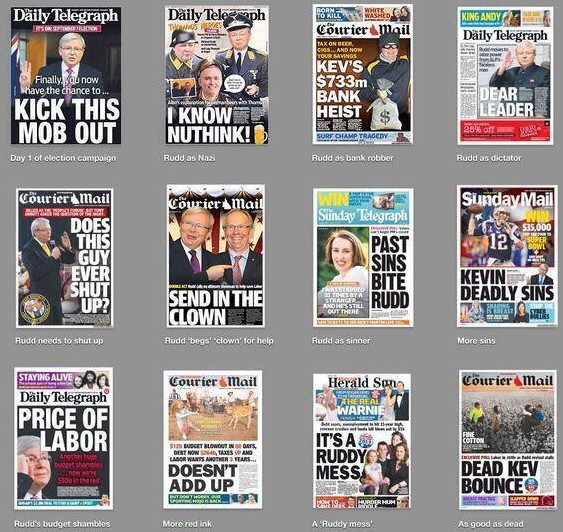Media organisations are among the most powerful social, economic and political weapons on Earth. They have the ability to influence and control public on matters across the spectrum. However, such pursuits prove to be more dangerous when that consolidated power is only shared by the top few media proprietors. The centralisation of media ownership threatens freedom of expression and limits a diverse public discussion on relevant issues. As Elizabeth Hart claims, it damages ‘the quality and depth of national and international media’ (Hart 2011, p.400). This clearly reflects the current age of Murdochracy, with giant media mogul, Rupert Murdoch’s News Limited controlling 70 percent of metropolitan newspapers and 23 percent of the regional dailies (Hart 2011, p.406). In certain cities, such as Brisbane, the only newspaper available to residents is Murdoch owned. Given Mr. Murdoch’s vast hold on the newspapers, his moods and beliefs prove to be a ‘game-changer’ in Australian politics.
Rupert Murdoch arguably shaped the direction of the 2013 Australian federal elections through his continuous character assassinations of then Labor leaders, Kevin Rudd and Julia Gillard. While Murdoch supported Kevin Rudd in the 2007 election, the 2013 election was all about Tony Abbott. Thus Murdoch used his newspapers as a platform to express his own Anti-Rudd opinion. For example, throughout the campaign, The Daily Telegraph’s front-page aggressively slashed Kevin Rudd and the ALP. On the first day of the campaign, The Daily Telegraph’s headline bluntly held ‘KICK THE MOB OUT’. A few days later, the front page actually compared Kevin Rudd to a Nazi. It was clear that majority of the newspapers were against Rudd. Media Watch reported that in the first week of the election campaign, half of The Daily Telegraph’s political stories were anti-Labor, while none were against the Coalition. In the following weeks, 59 were anti-Labor; four were anti-Coalition; three stories were pro-Labor; and 19 were pro the Coalition. These stories were clearly personal attacks against Rudd himself, not the policies or performance of the actual government.
Seems hard to believe? Check out the the front pages of these newspapers:
In response to such limited coverage, GetUp!, an independent online activist group, launched a campaign against Rupert Murdoch, which essentially claimed that Australians could choose their own government. GetUp! even created an advertisement, which was banned from airing on Australia’s major commercial TV networks. Click here for more information.
Elizabeth Hart claims that ‘whoever owns the media, owns the message’ (Hart 2011, p.402). Therefore, it does matter who owns and controls the media because the projected narrow message can have a profound impact on the way in which individuals form their own views. In the age of Murdochracy, it is arguably more difficult for individuals to form their own opinions. Perhaps our opinions are an extension of Rupert Murdoch? Nevertheless, the example of the 2013 Election campaign demonstrates the way in which media ownership goes against the principles of democracy. However, despite such concerns, Australians can still resort to social media —i.e. GetUp!— to express their opinions. Platforms such as Facebook and Twitter are great spaces for individuals to share and receive a variety of different viewpoints. Therefore, it is still possible to have an open and rich discussion on political affairs.
Reference List
Articles/Online Sources
GetUp! 2013, Get this ad on the air, GetUp! Organisation, viewed 28 March 2014, <https://www.getup.org.au/campaigns/media/murdochs-election-campaign/get-this-ad-on-the-air>
GetUp! 2013, Why we were banned, GetUp! Organisation, viewed 28 March 2014, < https://www.getup.org.au/campaigns/media/murdoch-ad-update/why-we-were-banned>
Hart, E 2011, ‘Case study 6: media ownership’, in J Bainbridge, N Goc & L Tynan (eds.), Media and Journalism : New Approaches to Theory and Practice, 2nd edn, Oxford University Press, South Melbourne, Victoria, pp400-408.
Lallo, M 2013, ‘Anti-Murdoch ad banned from television’, The Age, 3 September, viewed 28 March 2014, < http://www.theage.com.au/entertainment/tv-and-radio/antimurdoch-ad-banned-from-television-20130903-2t37c.html>
McKnight, D 2013, ‘Rupert Murdoch and his influence on Australian political life’, The Guardian, 7 August, viewed 28 March 2014, < http://www.theguardian.com/commentisfree/2013/aug/07/rupert-murdoch-australian-election-2013>
Media Watch 2013, Rupert Tweets, The Tele Repeats, ABC, viewed 28 March 2014, < http://www.abc.net.au/mediawatch/transcripts/s3834127.htm>.
Taylor, A 2013, ‘Rupert Murdoch Got What He Wanted In The Australian Election’, Business Insider Australia, 8 September, viewed 28 March 2014, < http://www.businessinsider.com.au/rupert-murdoch-got-what-he-aimed-for-with-the-australian-election-2013-9>
Video
Getupaustralia 2013, Thanks Rupert Murdoch, but Australians can choose their own government, video, YouTube, 27 August, viewed 28 March 2014 < https://www.youtube.com/watch?v=grqp-JQMFuM>
MWVideo AU 2013, Rupert Tweets, The Tele Repeats, video, YouTube, 26 August, viewed 28 March 2014 < https://www.youtube.com/watch?v=z5q7ZwV2kZE>



